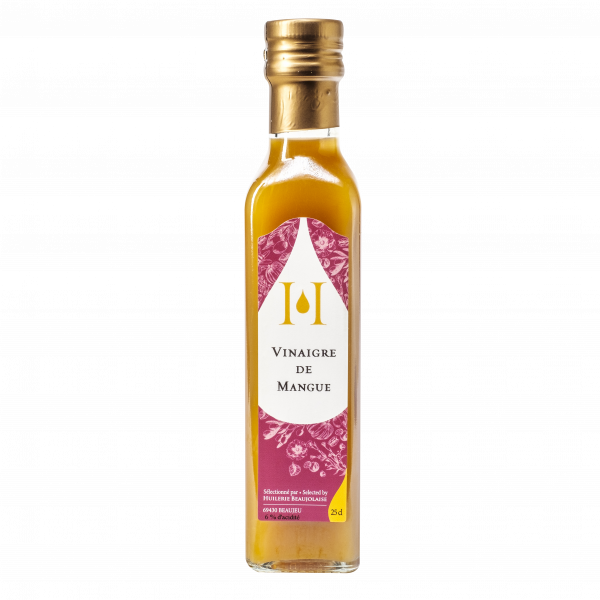
The Aromas of Mango Vinegar
Mango vinegar is characterized by its intense and fruity aroma of ripe mango. It offers a combination of sweet and tangy flavors, creating a perfect balance between sweetness and liveliness. The aroma of mango vinegar evokes the natural and delicious scent of fresh mango, adding an exotic and tropical touch to your dishes and sauces.
The History of Mango Vinegar
Traditionally used in Asian cuisine, mango vinegar has become increasingly popular worldwide for its unique flavor qualities. Its use has diversified over time, finding its place in sauces, marinades, dressings, and even cocktails, adding a touch of originality and exoticism to many dishes and beverages. Today, mango vinegar is appreciated for its rich and fruity taste.
More About the Making of Mango Vinegar
The fruits are harvested when ripe and mixed with vinegar, and then sweetened with cane sugar. This vinegar is born from a double fermentation process of mango puree: first, an alcoholic fermentation where the natural yeasts in the fruit juice convert sugar into alcohol, thus turning the juice into wine.
Then, the natural bacteria present in the fruit wine transform this alcohol into vinegar, without undergoing any pasteurization. After this process, the vinegar is carefully filtered before being bottled, preserving its authentic character and exquisite aromas.
How to Use Mango Vinegar
With a pronounced tropical fragrance, this mango vinegar is a must-have to accompany your raw vegetables, pairing perfectly with the freshness of raw vegetables.
How to Store Mango Vinegar
It should be stored at room temperature, preferably in a dry place and away from light. It's worth noting that over time or depending on temperatures, slight cloudiness may occur, but this does not affect the quality of the product.
Suggestions for Using Mango Vinegar
- California Salad with Mango Vinegar: Peel a pink grapefruit and remove the segments by cutting along the white membranes. Collect the juice in a bowl. Cut an apple into slices and halve 10 cherry tomatoes. Add mango vinegar and olive oil to the bowl, mix, season with salt and pepper. Arrange the plates with mesclun, apple slices, grapefruit segments, cherry tomatoes, and shrimp. Drizzle with vinaigrette, sprinkle with fleur de sel, and serve immediately;
- Scallops and Mango Vinegar: Decorate your plate with a little mango vinegar. Place pieces of mango cut in a circle. In a hot pan, cook the scallops for barely a minute on each side. Place a scallop on a piece of mango. Sprinkle with salt and enjoy immediately;
- Tomato Carpaccio with Mango Vinegar: Slice 2 tomatoes, a chili pepper, an onion, and a shallot into thin slices. In a bowl, arrange the tomato slices around the edges. Spread some slices of chili pepper, shallot, and onion, then season everything with mango vinegar.
| Allergen | Sulfites / Sulphites |
|---|---|
| Native country | ALLEMAGNE |
| naturel de mangue | |
| Nutritional Info | VN Energie pour 100 g (energy for 100g) : 446 kJ / 105 kcal VN Matière grasse (fat) : <0.5 g Dont acide gras saturés (of which saturated fat) : <0.1 g VN Glucides (carbohydrate) : 22 g Dont sucres (of which sugars) : 22 g VN Protéines (protein) : <0.5 g Vn Sel (salt) : 0 mg |
 Français
Français 